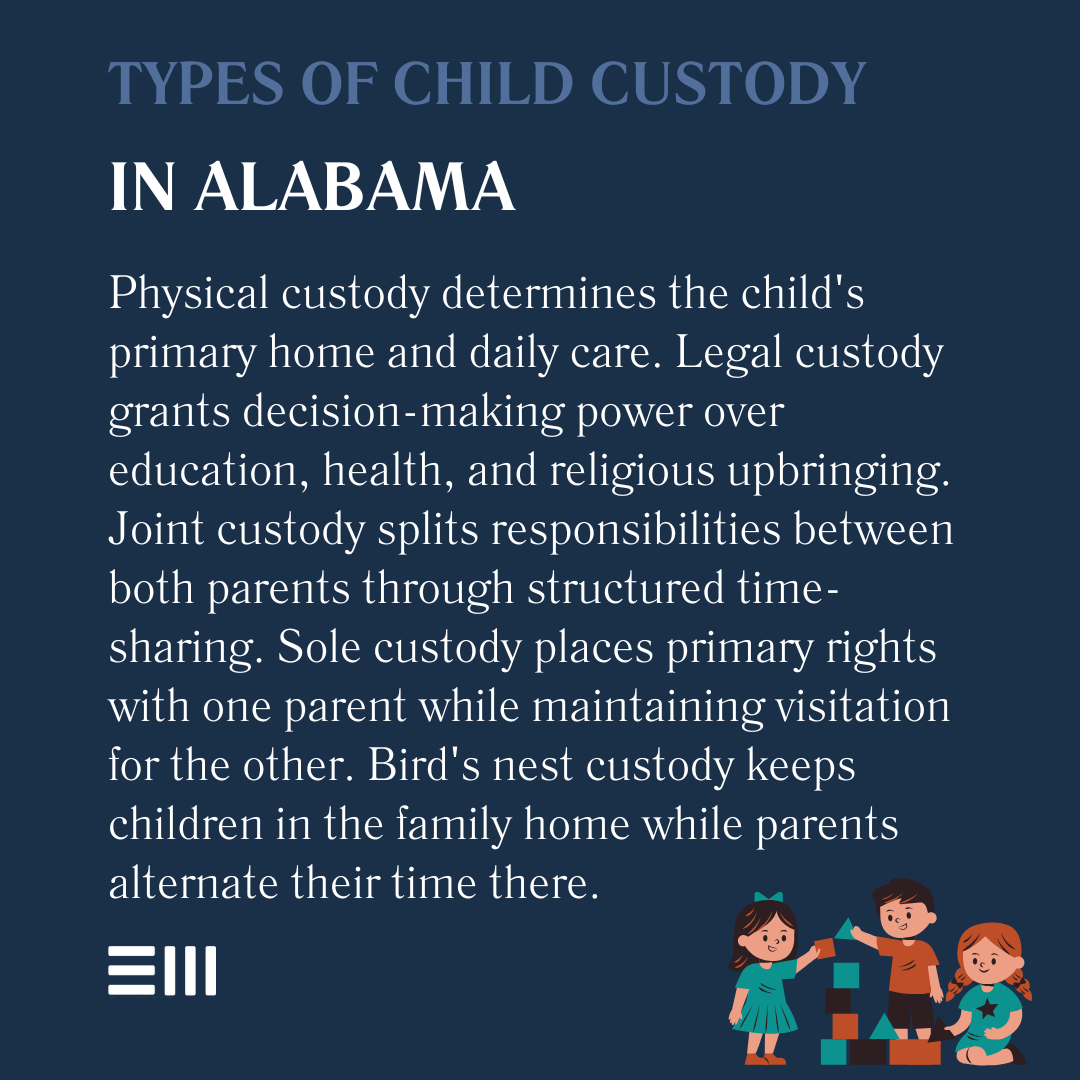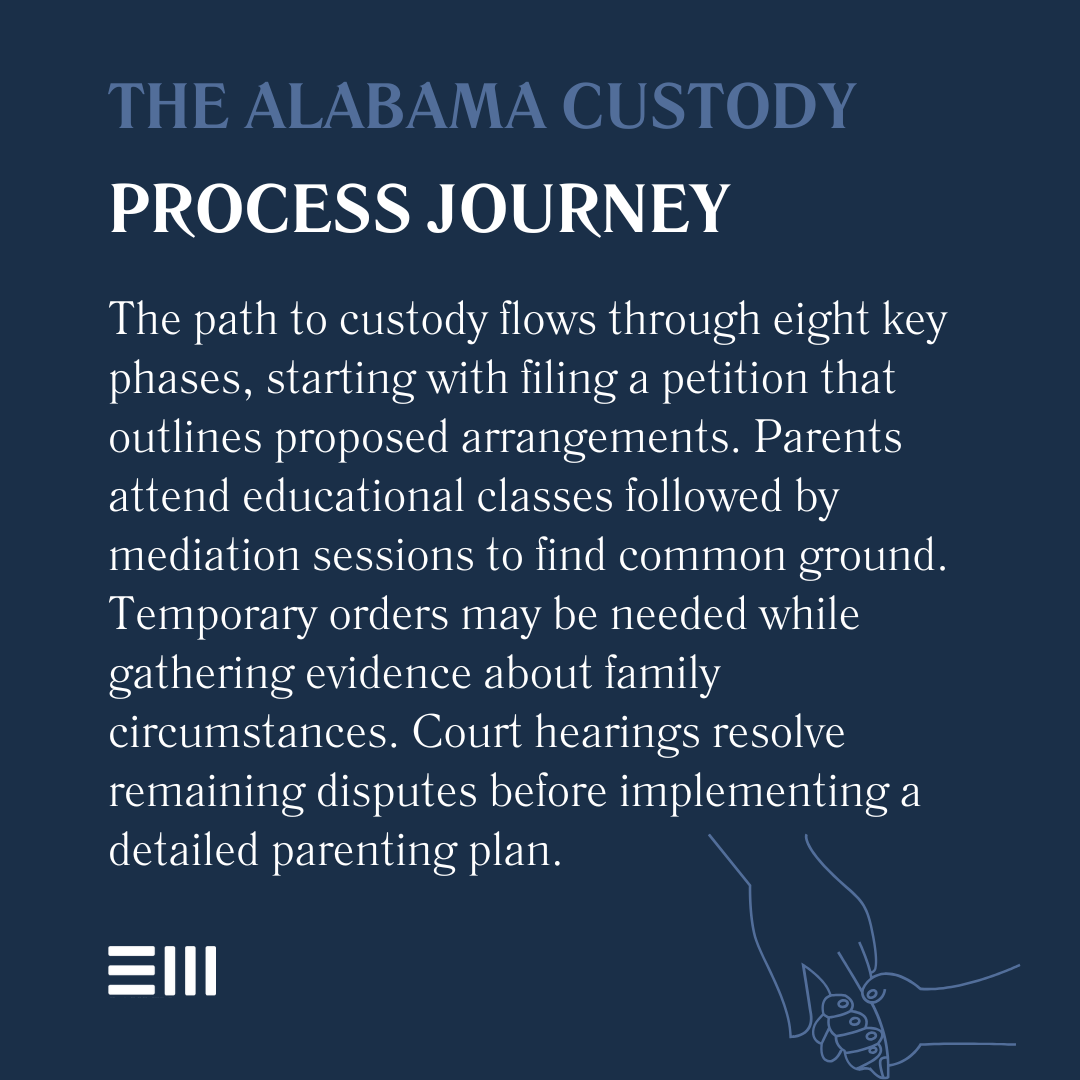Every night across Alabama, children rest their heads in different homes, part of an intricate dance of shared bedtimes, weekend visits, and holiday schedules.
Behind each carefully crafted custody arrangement lies a story of families rebuilding and adapting, all while keeping their children's future at heart.
Understanding Child Custody in Alabama
Walking into an Alabama family courthouse means stepping into a place where life-changing decisions happen daily.
Parents who once shared every moment of their children's lives now navigate a new reality of divided time and shared responsibilities.
From Birmingham's busy suburbs to quiet rural communities, each family's journey through custody arrangements reflects their unique circumstances and challenges.
Alabama recognizes several types of custody arrangements:
- Physical Custody: Determines where the child lives and oversees daily care responsibilities
- Legal Custody: Controls decision-making rights for education, healthcare, religion, and extracurricular activities
- Joint Custody: Shared responsibilities between both parents, with structured time-sharing arrangements
- Sole Custody: One parent holds primary custody rights, while the other typically maintains visitation
- Bird's Nest Custody: An innovative arrangement where children remain in the family home while parents alternate residence
Modern Alabama courts have moved beyond outdated assumptions about parenting roles, recognizing that children often thrive best with both parents actively involved in their lives.
This evolution in family law reflects our deeper understanding of children's emotional needs and development.
Factors That Influence Custody Decisions
Inside courtrooms across Birmingham, Montgomery, and Mobile, judges weigh countless elements of family life that many parents take for granted.
Every soccer practice, doctor's appointment, and parent-teacher conference tells part of a larger story about a child's life and needs.
Alabama courts carefully examine:
- The child's relationship with each parent, including emotional bonds and daily interactions;
- Each parent's physical and mental health that might affect childcare ability;
- The child's educational needs and opportunities, from homework help to college preparation;
- Home environment stability, including safety, comfort, and routine;
- Each parent's work schedule and availability for active parenting;
- The child's community connections, from neighborhood friends to church groups;
- Any concerns about domestic violence or substance abuse;
- The child's preferences, when age-appropriate;
- Each parent's willingness to support ongoing relationships with the other parent; and
- Extended family support systems and involvement.
Understanding these factors helps parents prepare thoughtfully for custody proceedings, focusing on what truly matters for their children's well-being.
The Legal Process for Child Custody in Alabama
From the Tennessee Valley to the Gulf Coast, Alabama's custody process follows a structured path designed to protect children's interests while respecting parental rights:
- Filing the initial custody petition outlining proposed arrangements;
- Attending mandatory parenting classes that offer valuable insights into children's needs;
- Participating in mediation to find common ground;
- Attending temporary orders hearings when necessary;
- Gathering and presenting evidence about family circumstances;
- Participating in final court hearings if agreements aren't reached;
- Implementing detailed parenting plans; and
- Making adjustments as children's needs evolve.
While some families reach agreements quickly, others need more time to work through complex situations. Each step presents opportunities to demonstrate commitment to your children's well-being.
Protecting Your Rights Throughout the Process
Success in custody matters often depends on careful preparation and attention to detail. Essential steps include:
- Documenting your involvement in your child's daily life;
- Creating a stable, nurturing home environment;
- Building positive relationships with teachers and caregivers;
- Maintaining respectful communication with your co-parent;
- Following court orders consistently;
- Keeping detailed records of expenses and interactions;
- Staying actively involved in your child's education and activities; and
- Demonstrating flexibility when unexpected schedule changes arise.
Professional legal guidance helps navigate these responsibilities while protecting your parental rights.
Frequently Asked Questions About Child Custody in Alabama
The path through custody arrangements raises many questions for Alabama parents.
Here are answers to common concerns we address:
How Does Alabama Determine the Best Interest of the Child?
Like piecing together a family photo album, courts examine every aspect of a child's life. From daily routines to emotional bonds, each element contributes to understanding what arrangement will best serve the child's needs.
Judges often consider input from teachers, counselors, and child development experts to build a complete picture.
What Rights Do Unmarried Parents Have?
Unmarried parents face unique challenges in establishing custody rights.
While mothers automatically receive primary custody in Alabama, fathers can build their legal rights through proper channels.
Success often depends on demonstrating consistent involvement and commitment to the child's well-being.
Can I Modify an Existing Custody Order?
Life rarely stands still, especially for growing families. When circumstances change significantly, parents can request modifications to custody arrangements.
Common reasons include:
- Career changes affecting availability;
- Relocation opportunities;
- Changes in children's needs or activities;
- Health issues; and
- Significant lifestyle changes.
Understanding when and how to seek modifications helps parents maintain arrangements that continue serving their children's evolving needs while respecting both parents' rights.
How Does Relocation Affect Custody?
Moving with children under a custody agreement requires careful consideration and usually court approval. Courts examine:
- The impact on parent-child relationships;
- Educational opportunities in the new location;
- The child's ties to their current community;
- Plans for maintaining relationships with both parents; and
- The necessity and motivation for the move.
By carefully weighing these factors and presenting a well-planned relocation proposal, parents can help courts make informed decisions that balance new opportunities with maintaining important family bonds.
What Role Do Children's Preferences Play?
As children grow older, their voices gain more weight in custody decisions. Courts consider their preferences alongside their maturity level and understanding of the situation.
Judges work to distinguish between well-reasoned preferences and temporary influences.
Legal Support for Your Family's Future
From downtown Birmingham to the quietest corners of rural Alabama, families face similar challenges in custody matters.
Our experienced family law attorneys understand both the legal complexities and emotional dynamics of these situations.
We've helped parents across Alabama create stable, nurturing arrangements that serve their children's best interests.
Contact us now to speak with an experienced Alabama child custody attorney. Our Birmingham office provides convenient access to comprehensive family law services focused on achieving positive outcomes for you and your children.


